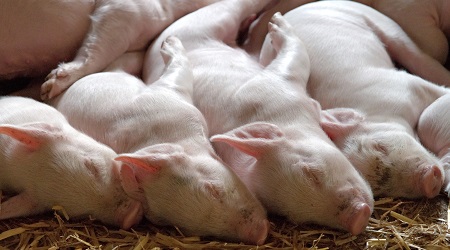
30/07/2018
Collaboration with the Danish R2Agro A/S
Along with the main motto of the NeoCons company – “Complementing each other” – we strive to support our partners through our efficient professional background and innovative methods among the versatile challenges of animal husbandry. This is why our joint collaboration with the Danish R2 Agro A/S company was born, which you could already read about in our previous article (https://www.neoconsfeed.hu/innovativ-megoldasok-napjaink-intenziv-sertesfajtai-szamara-malacneveles-1-resz/). We mentioned, when discussing the issues in the dropping box, a possible practice to save weak newborn piglets and the supplementation of their iron supply, and we presented the benefits of the breast milk supplement containing (among others) electrolytes.
In this article, you can gain insight into the challenges posed by heat stress and learn about possible ways to reduce heat stress from the perspective of feeding.
How to protect against heat stress
Today’s weather anomalies increasingly force us to develop new trends and practices both in crop production and animal husbandry (e.g. selective breeding: stress-tolerant varieties). This year spring was almost completely cancelled, and the swiftly coming summer brought great challenges to pig farmers. Heat stress develops gradually in the context of air temperature and relative air humidity. A particular problem can be reduced feed intake caused by stress, which is the primary cause of production loss, which is also maintained it if we do not intervene. During typically delicate physiological phases (late gestation, littering, selection, flocking, feed change, etc.), harmful consequences may occur that can cause the animals concerned to be removed from production for a long period of time and/or increase specific costs.
NoxiFerm provided by NeoCons's Consultants
In order to reduce the negative effects of heat stress, there are technology / plant management practices such as cooling of the room, ventilation, placement density, or reducing the temperature of drinking water. From the perspective of feeding, it is particularly important in this period to reduce oxidative stress in the animal’s body. For this purpose, vitamin C watering is applied or antioxidant supplements (betaine, vitamin E) are used, and in many farms, baking soda is added to the feed, especially for sows. The proven complementary feed used by R2 Agro against heat stress is NoxiFermTM, the effectiveness of which is based on the synergistic combination of special antioxidants and sodium gluconate. The results of an experiment at a plant with 1000 sows are shown in Table 1, where the mortality-reducing effect of NoxiFermTM proved to be significant.
Death data collected between July and August in groups that consumed and did not consume NoxiFermTM

NoxiFermTM :
- has a natural flavour boosting effect
- contains a combination of water and fat-soluble antioxidants
- is 3x more effective than synthetic vitamin E through its active polyphenol content
- has a beneficial effect on the small intestine’s epithelial cells and the intestinal mucosa
- 70% of its sodium gluconate content is utilized in the colon -> prebiotic effect
- gluconic acid promotes the production of short-chain fatty acids in the colon -> energy source
It is important to create the most favourable environmental conditions for animals when treating heat stress, but this is not always possible. NoxiFermTM is designed to support the intestinal tract of pigs through its antioxidant, energy-producing and appetite-enhancing effects during the period of heat stress, thereby ensuring the better digestion of nutrients needed for the organization and preventing the development of intestinal inflammation.
If you are interested in further opportunities to prevent heat stress, ask for information about the NeoPig HS program from your consultant!
Created by:
Gergely Bakti
Consultant







